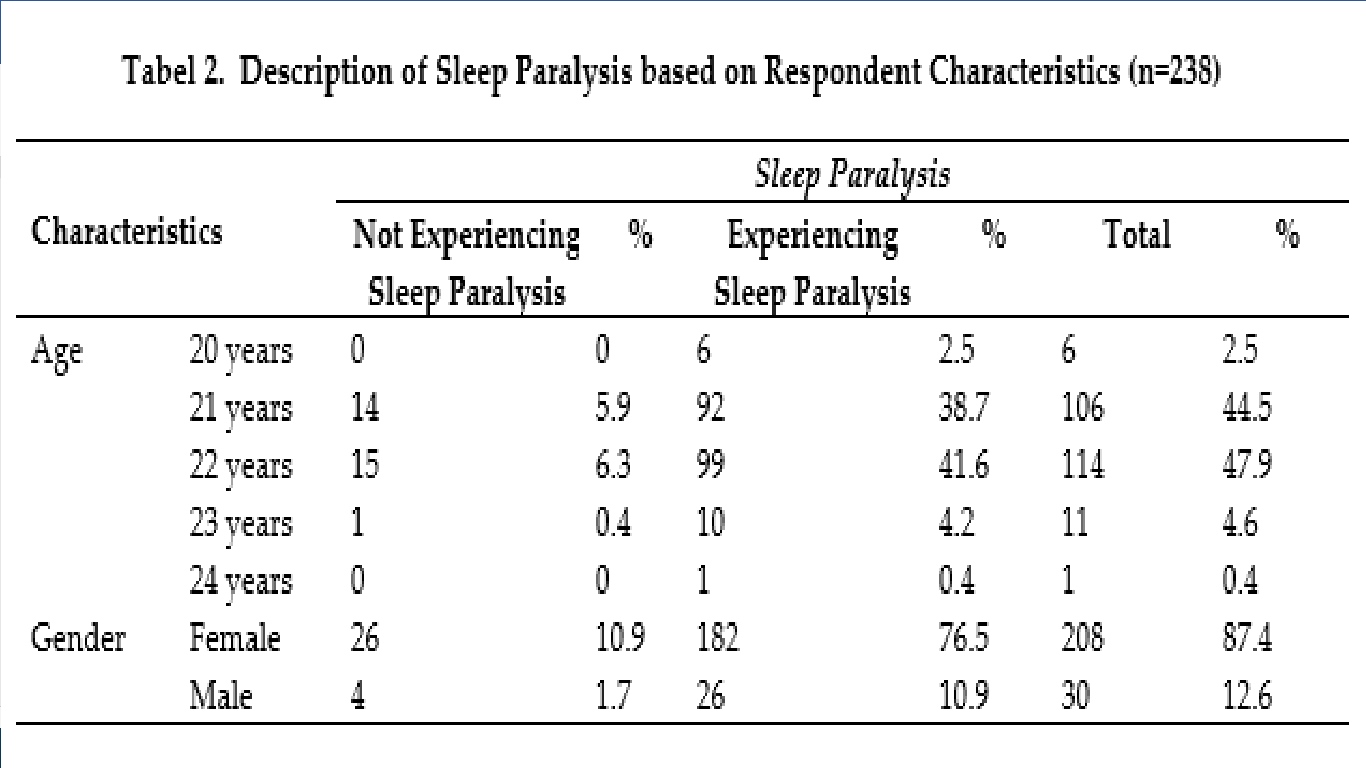The Relationship Between Stress Level and Sleep Paralysis During COVID-19 among Final-Year Nursing Students
DOI:
https://doi.org/10.23917/bik.v16i2.2350Abstract
World Health Organization warns that stress will increase due to the COVID-19 pandemic situation. Stress can disrupt sleep quality, and the potential for experiencing sleep paralysis is most common in students, which can reduce students' academic abilities. This study aimed to identify the correlation between stress levels and sleep paralysis in final-year nursing students during COVID-19.; The research design describes the correlation with a Cross-Sectional approach with a total sampling technique of 238 final-year nursing students. Data were analyzed using a chi-square test; Results: with Asymp.Sig 0.012˂0.05, there is a correlation between stress levels and sleep paralysis. More than half of 152 students (63.9%) with moderate stress levels experienced sleep paralysis, a small portion of 41 (17.2%) students with severe stress levels experienced sleep paralysis and students with mild stress levels 15 (6.3%) experienced sleep paralysis; Conclusions: in this study indicate that the highest stress level experiences sleep paralysis at moderate stress levels. Students are expected to further optimize the counseling activities held by the institution, and the institution can provide interventions such as progressive muscle relaxation therapy to reduce stress levels and sleep disturbances.
Downloads
References
AlAteeq, D. A., Aljhani, S., & AlEesa, D. (2020). Perceived stress among students in virtual classrooms during the COVID-19 outbreak in KSA. Journal of Taibah University Medical Sciences, 15(5), 398–403. https://doi.org/10.1016/j.jtumed.2020.07.004
Amanda, K., & Nugrahaeni, P. (2019). The relationship between academic anxiety and sleep paralysis in first year students of the Faculty of Medicine, Universitas Udayana. 6(1), 1–10.
Arista, M., & Tjang, Y. S. (2017). The Effect of Stress on the Incidence of Sleep Paralysis in Medical Faculty Students. Jurnal Psikologi Pendidikan Dan Konseling, 3(2), 41. https://doi.org/10.26858/jpkk.v0i0.4166
Arista, Y. S. T. (2017). The Effect of Stress on the Incidence of Sleep Paralysis in Medical Students. 3(2), 41–45.
Aslan, H., & Pekince, H. (2020). Nursing students’ views on the COVID-19 pandemic and their percieved stress levels. Perspectives in Psychiatric Care, (July). https://doi.org/10.1111/ppc.12597
Asri, & S. (2021). Sports Activities During The Covid-19 Pandemic Against The Stress Level Of Students Of Sports Education Of The Islamic University Of Kalimantan Muhammad Arsyad Al Banjari Banjarmasin. 4(1), 53–65.
Bao, Y., Sun, Y., Meng, S., Shi, J., & Lu, L. (2020). 2019-nCoV Epidemic: Address Mental Health Care to Empower Society. The Lancet, 395(10224), e37–e38. https://doi.org/10.1016/S0140-6736(20)30309-3
Cheyne, J. A., Pennycook, G., Cheyne, J. A., & Pennycook, G. (2013). Clinical Psychological Science. https://doi.org/10.1177/2167702612466656
Dewi & Ardani. (2013). Incidence Rate and Factors Affecting Sleep Disorder (Insomnia) in the Elderly at Tresna Werda Wana Seraya Denpasar Bali Social Institution in 2013. 1–9.
Gamayanti, W., Mahardianisa, M., & Syafei, I. (2018). Self Disclosure and Stress Levels in Students who are Working on Thesis. Psympathic : Jurnal Ilmiah Psikologi, 5(1), 115–130. https://doi.org/10.15575/psy.v5i1.2282
Gunawan Aditya, D. (2021). Psychological Wellbeing, Stress, and Emotional Regulation in New Students During the COVID-19 Pandemic. Jurnal Penelitian Dan Pengukuran Psikologi, 10(1), 51–64.
Hartini, S., Nisa, K., Herini, E. S., Keperawatan, M., Ilmu, D., Anak, K., … Regency, K. (2021). Factors Associated with Adolescent Sleep Problems During the COVID-19 Pandemic. 22(5), 311–317.
Hasanah, U., Ludiana, Immawati, & PH, L. (2020). Psychological Description of Students in the Learning Process During the COVID-19 Pandemic. Jurnal Keperawatan Jiwa, 8(3), 299–306.
Hulukati, R. D. (2018). ANALISIS TUGAS PERKEMBANGAN MAHASISWA FAKULTAS ILMU PENDIDIKAN UNIVERSITAS NEGERI GORONTALO. Jurnal Bikotetik, Vol.2(3), 73–80.
Jalal, B., Romanelli, A., & Hinton, D. E. (2020). Sleep paralysis in Italy: Frequency, hallucinatory experiences, and other features. Transcultural Psychiatry, 0(0), 1–13. https://doi.org/10.1177/1363461520909609
Kadek, N., Hening, D., Ketut, D., Utami, I., Marita, A., Menengah, S., … Penelitian, D. (2019). Incidence Of Sleep Paralysis In Adolescents of High School. 8(10).
Livana, Mubin, & B. (2020). Causes of Student Stress During the Covid-19 Pandemic. Jurnal Ilmu Keperawatan Jiwa, 3(2), 203–208.
Maia, B. R., & Dias, P. C. (2020). Anxiety, depression and stress in university students: The impact of COVID-19. Estudos de Psicologia (Campinas), 37, 1–8. https://doi.org/10.1590/1982-0275202037e200067
Mardiana & Zelfino. (2014). The Relationship Between Stress Levels in the Elderly and the Incidence of Hypertension in the Elderly. Forum Ilmiah, 11 no.2, 261–267.
Marelli, S., Castelnuovo, A., Somma, A., Castronovo, V., Mombelli, S., Bottoni, D., … Ferini-Strambi, L. (2020). Impact of COVID-19 lockdown on sleep quality in university students and administration staff. Journal of Neurology, (0123456789). https://doi.org/10.1007/s00415-020-10056-6
Noor, Z., Rustam, R., & Alam, R. I. (2021). Progressive Muscle Relaxation Has The Effect Of Reducing Stress In Final Year Students In The Nursing Study Program. 01(02), 123–132.
Nursalim, R. &. (2014). The Application of Group Counseling Using Coping Strategies to Reduce Learning Stress for Class X Students of SMA Negeri 1 Tuban. Journal BK, vol.04 no., 1–10.
Permatasari, Arifin, P. (2020). Descriptive Study of the Psychological Impact of Guidance and Counseling Study Program Students at Pgri Banyuwangi University in Compiling Thesis During the Covid-19 Pandemic. Jurnal Bina Ilmu Cendekia, 2(1), 127–141.
Potter, P., Perry, A., Stockert, P., & Hall, A. (2017). Fundamentals of nursing: Concepts, process, and practice. 9th Ed. St. Louis: MI: Elsevier Mosby.
Resna Junjunan. (2021). Description Of The Sleep Quality Of Students Which Are Preparing Thesis Faculty Of Nursing Padjadjaran University Garut Campus. Skripsi Fakultas Keperawatan.
Sharpless, B. A., & Barber, J. P. (2012). Lifetime Prevalence Rates of Sleep Paralysis: A Systematic Review. 15(5), 311–315. https://doi.org/10.1016/j.smrv.2011.01.007.Lifetime
Sulana, I. O. P., Sekeon, S. A. S., Mantjoro, E. M., Kesehatan, F., Universitas, M., Ratulangi, S., & Akhir, M. T. (2020). The relationship between stress levels and sleep quality of final year students of the Faculty of Public Health, Universitas Sam Ratulangi. Jurnal KESMAS, 9(7), 37–45.
Suwartika, A. N. & R. (2014). Analysis of Factors Associated with Regular Student Academic Stress Levels. Jurnal Keperawatan Soedirman, 9(3), 173–189.
Wang, X., Hegde, S., Son, C., Keller, B., Smith, A., & Sasangohar, F. (2020). Investigating mental health of US college students during the COVID-19 pandemic: Cross-sectional survey study. Journal of Medical Internet Research, 22(9). https://doi.org/10.2196/22817
World Health Organization. (2020). Mental health and psychological resilience during the COVID-19 pandemic.
Wr, P., Karakuła-juchnowicz, H., Flis, M., Rog, J., Hinton, D. E., Boguta, P., & Jalal, B. (2020). Prevalence and Clinical Picture of Sleep Paralysis in a Polish Student Sample. Int. J. Environ. Res. Public Health 2020.
Wulandari, Hadiati, & W. (2017). Correlation Between Stress Levels and Insomnia Levels of Medical Education Students, Faculty of Medicin. 6(2), 549–557.

Downloads
Submitted
Accepted
Published
How to Cite
Issue
Section
License
Copyright (c) 2023 Widya Nurwulan Santika Utami, Sukma Senjaya, Hasniatisari Harun, Vira Amelia

This work is licensed under a Creative Commons Attribution 4.0 International License.


















